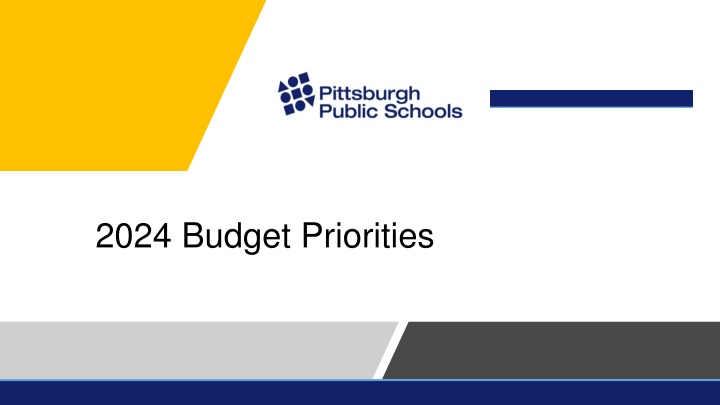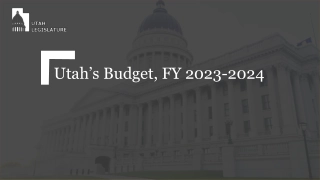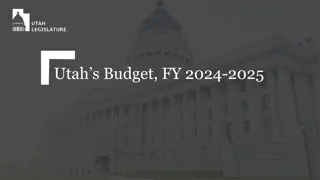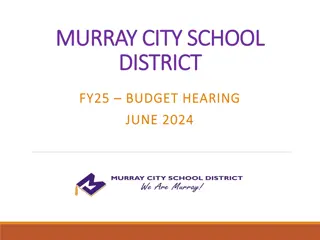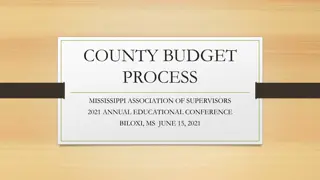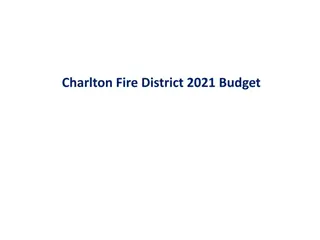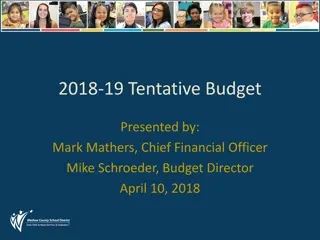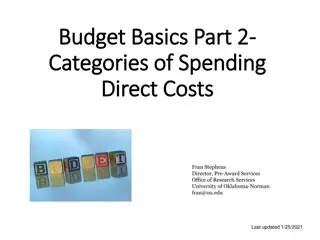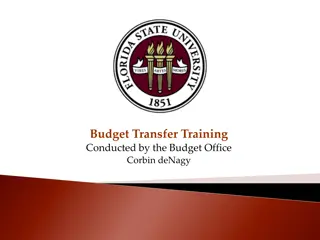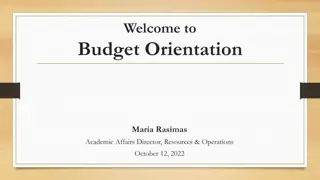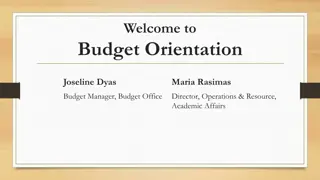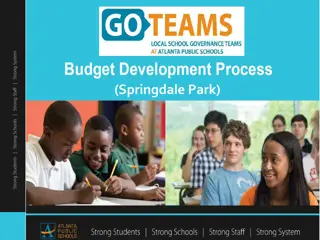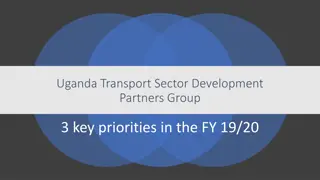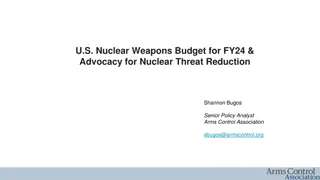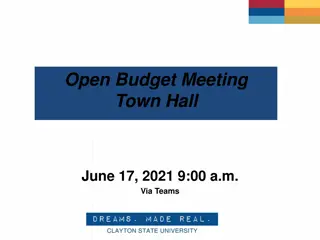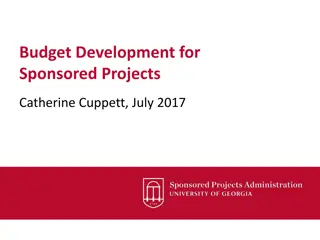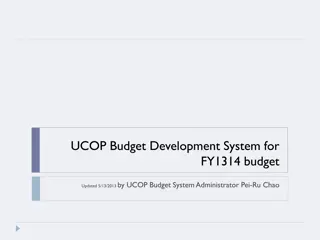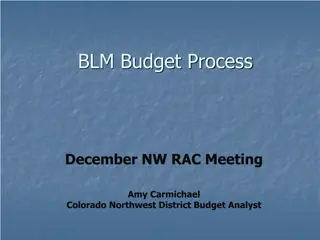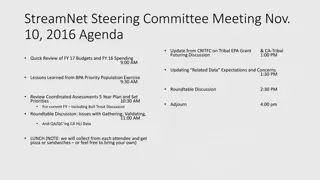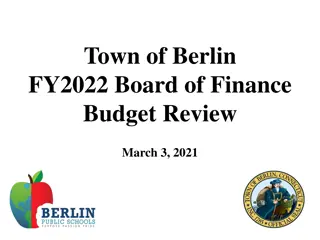Budget Development Process and Priorities for 2024
Review the timeline and process for developing the 2024 budget, emphasizing the strategic allocation of resources to ensure equity, excellence, and efficiency in Pittsburgh Public Schools. The budget workshops, agenda, and performance priorities aim to create a high-quality educational experience for all students while maintaining fiscal responsibility.
Uploaded on Sep 24, 2024 | 0 Views
Download Presentation

Please find below an Image/Link to download the presentation.
The content on the website is provided AS IS for your information and personal use only. It may not be sold, licensed, or shared on other websites without obtaining consent from the author.If you encounter any issues during the download, it is possible that the publisher has removed the file from their server.
You are allowed to download the files provided on this website for personal or commercial use, subject to the condition that they are used lawfully. All files are the property of their respective owners.
The content on the website is provided AS IS for your information and personal use only. It may not be sold, licensed, or shared on other websites without obtaining consent from the author.
E N D
Presentation Transcript
Agenda Review the Budget Development Timeline Discussion of Goals and Priorities 2
Budget Development Process/Timeline September State releases the annual Act 1 Index November Official Enrollment published December/January Enrollments Projections published and reviewed January Principals receive Site-Based Budgets February/March Governor s Budget Proposal March Site-Based Budgets provided to HR for staffing May June Departmental Budgets entered June Deadline to certify not to increase taxes beyond index June State Budget approved September October Department Budgets reviewed and finalized November Release of Preliminary General Fund Budget December Approval of the Final General Fund Budget 3
Budget Development Process/Timeline Sept. Oct. Nov. Dec. Jan. Feb. Mar. Apr. May Jun. Jul. Aug. Sept. Oct. Nov. Dec. State Act 1 Index Timeline Official Enrollment Published Enrollments Projections Published, Reviewed, and Finalized Site-Based Budget Process State Budget Process Departmental Budget Process General Fund Budget Release and Approval 4
Budget Workshops Adopted February 26, 2020 via Board resolution The Board authorizes that Board Operational Guideline 004 BOG 1 of 1 Role of the Board of Public Education be amended to require that no less than three (3) Budget Planning Workshops be held as a Committee of the Whole to assist the Board in its duties to approve an annual budget. That the Budget Planning Workshops described herein shall be scheduled by the Board President in consultation with the Superintendent. That the agenda for each Budget Planning Workshop shall be created by the Business Finance Committee in collaboration with Administration. Budget Workshops will occur in August, September, and October The August Workshop will be focus on understanding of the structure of the current budget The September and October workshops will be a discussion of funding priorities for the 2024 Budget 5
Performance Priority 5 - Strategically allocate resources to ensure equity, excellence, and efficiency. Context: Every child living within Pittsburgh Public Schools footprint is entitled to a high- quality and robust educational experience, regardless of race, zip code, gender (including gender identity or expression), disability, sexual orientation, ethnicity, and economic designation. Therefore, our schools must strategically allocate resources and become vibrant community hubs that demonstrate fiscal responsibility through efficient operations while maintaining safe, effective, modern learning environments. Additionally, Pittsburgh Public Schools is committed to eliminating racial achievement disparities by investing in research, curriculum, assessment, data analysis, and accountability constructs that are culturally responsive and prioritize student needs and outcomes. To actualize this desire, we must utilize an equity lens of access, support, and services to drive decisions that impact student learning experiences and outcomes informed by data. Understanding that our mission is rooted in creating community, we embrace consistent collaboration, partnerships, and relationships with key stakeholders, inclusive of the most marginalized, to create optimal student learning experiences. 6
Performance Priority 5 - Strategically allocate resources to ensure equity, excellence, and efficiency. Action Steps: 1. Formalize and communicate definitions of equity, excellence, and efficiency in the Pittsburgh Public Schools. 2. Evaluate and assess how financial resources are currently allocated in ways that ensure equity, excellence, and efficiency. 3. Investigate exemplar resources allocation models that advance equity, excellence, and efficiency. 4. Work collaboratively with the Board of Directors and Leadership Team to create design principles that inform the strategic allocation and optimization of resources (human, financial, physical plant, infrastructure, instructional, etc.) to ensure equity, excellence, and efficiency. 5. Create an informational resource outlining the potential impact of resource allocation rooted in equity, excellence, and efficiency to support the improvement of student experiences and outcomes. 6. Create and expand opportunities for stakeholder feedback regarding needed resources to ensure equity, excellence, and efficiency. 7. Design collaborative stakeholder teams to create core recommendations that begin the journey of addressing strategic allocation of resources to ensure equity, excellence, and efficiency. 7
Design Principles (Academics): Pittsburgh Public Schools is committed to eliminating racial achievement disparities by investing in research, curriculum, assessment, data analysis, and accountability constructs that are culturally responsive and prioritize student needs and outcomes. (Programs & Services): Pittsburgh Public Schools utilizes an equity lens of access, support, and services to drive decisions that impact student learning experiences and outcomes informed by data. (People & Staff): Pittsburgh Public Schools embraces consistent collaboration, partnerships, and relationships with key stakeholders inclusive of the most marginalized to create optimal student learning experiences. (Structural and Financial): Pittsburgh Public School buildings are vibrant community hubs that demonstrate fiscal responsibility through efficient operations while maintaining safe, effective, modern learning environments. 8
Our enrollment declined by nearly 25% since 2012-13 24,849 24,525 25,000 24,103 23,639 23,286 22,362 21,826 21,275 20,438 20,000 19,245 18,648 15,000 10,000 5,000 - 2012-13 2013-14 2014-15 2015-16 2016-17 2017-18 2018-19 2019-20 2020-21 2021-22 2022-23 9
Charter enrollment grew by over 52% during the same period 5,327 5,197 5,038 5,000 4,687 4,382 4,221 4,109 3,891 4,000 3,772 3,551 3,498 3,000 2,000 1,000 - 2012-13 2013-14 2014-15 2015-16 2016-17 2017-18 2018-19 2019-20 2020-21 2021-22 2022-23 10
Charter growth is not the sole cause of enrollment decline 1,200 1,000 800 600 400 200 - 2012-13 2013-14 2014-15 2015-16 2016-17 2017-18 2018-19 2019-20 2020-21 2021-22 2022-23 Enrollment Decline 182 324 422 464 353 924 536 551 837 1,193 585 Charter Growth 385 53 221 119 218 112 161 305 351 159 130 11
Budgeting Priorities Sustaining the investment in Counselors and Social Workers Ensuring a 350:1 student to Counselor Ratio Job-embedded professional learning Ensuring that teachers and staff have sufficient, job-embedded support, coaching and supervision to meet teaching and learning objectives. Evaluation and Prioritization of ESSER investments for continuation *Please note that priorities are subject to change based on the strategic planning process 12
Questions? 13
